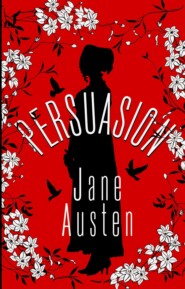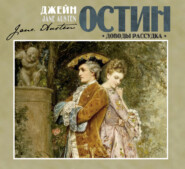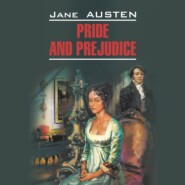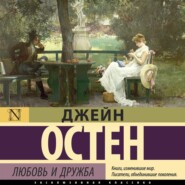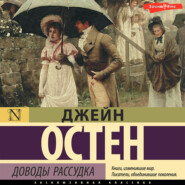По всем вопросам обращайтесь на: info@litportal.ru
(©) 2003-2025.
✖
Pride and Prejudice / Гордость и предубеждение
Настройки чтения
Размер шрифта
Высота строк
Поля
“Miss Eliza Bennet,” said Miss Bingley, “despises cards. She is a great reader.”
“Not at all, I am not a great reader,” cried Elizabeth; “and I have pleasure in many things.”
Elizabeth walked towards the table where a few books were lying. “I am astonished,” said Miss Bingley, “that my father has such a small collection of books. What a delightful library you have, Mr. Darcy!”
“It is good,” he replied, “I am always buying books.”
“It is amazing to me,” said Bingley, “how young ladies can have patience to be so educated as they all are.”
“All young ladies educated! My dear Charles, what do you mean?”
“Yes, all of them, I think. They all paint pictures, and net purses. I scarcely know anyone who cannot do all this.”
“I am very far from agreeing with you in your estimation of ladies in general,” said Darcy, “I cannot name five women, that are really educated.”
“Nor I, I am sure,” said Miss Bingley.
“Then,” observed Elizabeth, “in your opinion, who is an educated woman?”
“Oh! No one can be really educated who does not know necessary things. A woman must know music, singing, drawing, dancing, and the modern languages, to deserve the word; and besides all this, she must possess a certain something in her air and manner of walking, the tone of her voice, her address and expressions.”
“All this she must possess,” added Darcy, “and the most important thing, she must read a lot.”
The conversation was over, and Elizabeth soon afterwards left the room.
“Elizabeth Bennet,” said Miss Bingley, when the door was closed, “is one of those young ladies who try recommend themselves to the men; and with many men it succeeds.”
Elizabeth joined them again only to say that her sister was worse, and that she could not leave her. Bingley was quite uncomfortable; his sisters declared that they were miserable.
Chapter 9
Elizabeth passed the night in her sister’s room. Suddenly Mrs. Bennet, accompanied by her two youngest girls, came to Netherfield soon after the family breakfast.
If she found Jane in a danger, Mrs. Bennet would have been very miserable. But she was satisfied that her illness was not dangerous. She would not listen, therefore, to her daughter’s proposal of coming home. After sitting a little while with Jane, the mother and three daughters came into the breakfast parlour. Bingley met them with hopes that Mrs. Bennet had not found Miss Bennet worse than she expected.
“Indeed I have, sir,” was her answer. “She is too ill to be moved. We must use your kindness a little longer. You have a sweet room here, Mr. Bingley. I do not know a place in the country that is equal to Netherfield. You will not think of quitting it in a hurry.”
“Whatever I do is done in a hurry,” replied he; “But at present, however, I consider myself as quite fixed here.”
“That is exactly what I should have supposed of you,” said Elizabeth.
“You begin to comprehend me, do you?” cried he.
“Oh! yes-I understand you perfectly.”
“Lizzy,” cried her mother, “remember where you are, and do not continue in the wild manner that you use at home.”
“I did not know before,” continued Bingley immediately, “that you were a studier of character. It must be an amusing study.”
“The country,” said Darcy, “can in general supply a few subjects for such a study.”
“Yes, indeed,” cried Mrs. Bennet, offended by his manner of mentioning a country neighbourhood. “I cannot see that London has any great advantage over the country, except the shops and public places. The country is far more pleasant, is it not, Mr. Bingley?”
“When I am in the country,” he replied, “I never wish to leave it; and when I am in town it is the same. They have each their advantages.”
“That is because you have the right disposition. But that gentleman,” looking at Darcy, “seemed to think the country was nothing at all.”
“Indeed, Mamma, you are mistaken,” said Elizabeth, blushing for her mother. “You quite mistook Mr. Darcy. He only meant that there was not such a variety of people to be met with in the country as in the town.”
“Certainly, my dear, but we dine with twenty-four families.”
Elizabeth asked her mother if Charlotte Lucas had been at Longbourn.
“Yes, she came yesterday with her father. What an agreeable man Sir William is, Mr. Bingley, is not he? He has always something to say to everybody.”
“Did Charlotte dine with you?”
“No, she went home. The Lucases are a very good sort of girls, I assure you. It is a pity they are not handsome! Not that I think Charlotte so very plain – she is our friend.”
“She seems a very pleasant young woman.”
“Oh! dear, yes; but you must agree she is very plain. Lady Lucas herself has often said so, and envied me Jane’s beauty. I do not like to boast of my own child, but to be sure, Jane – one does not often see anybody better looking. It is what everybody says. When she was only fifteen, there was a man so much in love with her that my sister-in-law was sure he would make her an offer. But, however, he did not. Perhaps he thought she was too young. However, he wrote some verses on her, and very pretty they were.”
“I wonder,” said Elizabeth impatiently, “who first discovered the poetry was driving away love!”
“I always thought that the poetry was the food of love,” said Darcy.
“Maybe. Everything nourishes what is strong already. But if it is weak, one good sonnet will kill it.”
Darcy only smiled; Mrs. Bennet began to thank Mr. Bingley for his kindness to Jane, with an apology for troubling him also with Lizzy. Mr. Bingley was very civil in his answer, and forced his younger sister to be civil also, and say what the occasion required.
Lydia was a stout girl of fifteen, with a fine complexion and good-humoured countenance; a favourite with her mother, whose affection had brought her into public at an early age. She had a sort of natural self-consequence. She reminded Mr. Bingley about the ball that he had promised to organise. And she added, that it would be the most shameful thing in the world if he did not keep his promise. His answer was delightful to their mother’s ear:
“I am perfectly ready, I assure you, to keep my promise, when your sister is recovered. But you would not wish to dance when she is ill.”
Lydia declared herself satisfied. “Oh! yes – it would be much better to wait till Jane was well, and by that time most likely Captain Carter would be at Meryton again.”
Mrs. Bennet and her daughters then left, and Elizabeth returned instantly to Jane.
Chapter 10
Mrs. Hurst and Miss Bingley had spent some hours of the morning with Jane, who continued, though slowly, to recover; and in the evening Elizabeth joined their party in the drawing-room. Mr. Darcy was writing, and Miss Bingley, seated near him. Mr. Hurst and Mr. Bingley were playing cards, and Mrs. Hurst was observing their game.
Elizabeth took up some needlework, and was sufficiently amused looking what happened between Darcy and his companion.
“How delighted Miss Darcy will be to receive such a letter!”
He made no answer.
“Not at all, I am not a great reader,” cried Elizabeth; “and I have pleasure in many things.”
Elizabeth walked towards the table where a few books were lying. “I am astonished,” said Miss Bingley, “that my father has such a small collection of books. What a delightful library you have, Mr. Darcy!”
“It is good,” he replied, “I am always buying books.”
“It is amazing to me,” said Bingley, “how young ladies can have patience to be so educated as they all are.”
“All young ladies educated! My dear Charles, what do you mean?”
“Yes, all of them, I think. They all paint pictures, and net purses. I scarcely know anyone who cannot do all this.”
“I am very far from agreeing with you in your estimation of ladies in general,” said Darcy, “I cannot name five women, that are really educated.”
“Nor I, I am sure,” said Miss Bingley.
“Then,” observed Elizabeth, “in your opinion, who is an educated woman?”
“Oh! No one can be really educated who does not know necessary things. A woman must know music, singing, drawing, dancing, and the modern languages, to deserve the word; and besides all this, she must possess a certain something in her air and manner of walking, the tone of her voice, her address and expressions.”
“All this she must possess,” added Darcy, “and the most important thing, she must read a lot.”
The conversation was over, and Elizabeth soon afterwards left the room.
“Elizabeth Bennet,” said Miss Bingley, when the door was closed, “is one of those young ladies who try recommend themselves to the men; and with many men it succeeds.”
Elizabeth joined them again only to say that her sister was worse, and that she could not leave her. Bingley was quite uncomfortable; his sisters declared that they were miserable.
Chapter 9
Elizabeth passed the night in her sister’s room. Suddenly Mrs. Bennet, accompanied by her two youngest girls, came to Netherfield soon after the family breakfast.
If she found Jane in a danger, Mrs. Bennet would have been very miserable. But she was satisfied that her illness was not dangerous. She would not listen, therefore, to her daughter’s proposal of coming home. After sitting a little while with Jane, the mother and three daughters came into the breakfast parlour. Bingley met them with hopes that Mrs. Bennet had not found Miss Bennet worse than she expected.
“Indeed I have, sir,” was her answer. “She is too ill to be moved. We must use your kindness a little longer. You have a sweet room here, Mr. Bingley. I do not know a place in the country that is equal to Netherfield. You will not think of quitting it in a hurry.”
“Whatever I do is done in a hurry,” replied he; “But at present, however, I consider myself as quite fixed here.”
“That is exactly what I should have supposed of you,” said Elizabeth.
“You begin to comprehend me, do you?” cried he.
“Oh! yes-I understand you perfectly.”
“Lizzy,” cried her mother, “remember where you are, and do not continue in the wild manner that you use at home.”
“I did not know before,” continued Bingley immediately, “that you were a studier of character. It must be an amusing study.”
“The country,” said Darcy, “can in general supply a few subjects for such a study.”
“Yes, indeed,” cried Mrs. Bennet, offended by his manner of mentioning a country neighbourhood. “I cannot see that London has any great advantage over the country, except the shops and public places. The country is far more pleasant, is it not, Mr. Bingley?”
“When I am in the country,” he replied, “I never wish to leave it; and when I am in town it is the same. They have each their advantages.”
“That is because you have the right disposition. But that gentleman,” looking at Darcy, “seemed to think the country was nothing at all.”
“Indeed, Mamma, you are mistaken,” said Elizabeth, blushing for her mother. “You quite mistook Mr. Darcy. He only meant that there was not such a variety of people to be met with in the country as in the town.”
“Certainly, my dear, but we dine with twenty-four families.”
Elizabeth asked her mother if Charlotte Lucas had been at Longbourn.
“Yes, she came yesterday with her father. What an agreeable man Sir William is, Mr. Bingley, is not he? He has always something to say to everybody.”
“Did Charlotte dine with you?”
“No, she went home. The Lucases are a very good sort of girls, I assure you. It is a pity they are not handsome! Not that I think Charlotte so very plain – she is our friend.”
“She seems a very pleasant young woman.”
“Oh! dear, yes; but you must agree she is very plain. Lady Lucas herself has often said so, and envied me Jane’s beauty. I do not like to boast of my own child, but to be sure, Jane – one does not often see anybody better looking. It is what everybody says. When she was only fifteen, there was a man so much in love with her that my sister-in-law was sure he would make her an offer. But, however, he did not. Perhaps he thought she was too young. However, he wrote some verses on her, and very pretty they were.”
“I wonder,” said Elizabeth impatiently, “who first discovered the poetry was driving away love!”
“I always thought that the poetry was the food of love,” said Darcy.
“Maybe. Everything nourishes what is strong already. But if it is weak, one good sonnet will kill it.”
Darcy only smiled; Mrs. Bennet began to thank Mr. Bingley for his kindness to Jane, with an apology for troubling him also with Lizzy. Mr. Bingley was very civil in his answer, and forced his younger sister to be civil also, and say what the occasion required.
Lydia was a stout girl of fifteen, with a fine complexion and good-humoured countenance; a favourite with her mother, whose affection had brought her into public at an early age. She had a sort of natural self-consequence. She reminded Mr. Bingley about the ball that he had promised to organise. And she added, that it would be the most shameful thing in the world if he did not keep his promise. His answer was delightful to their mother’s ear:
“I am perfectly ready, I assure you, to keep my promise, when your sister is recovered. But you would not wish to dance when she is ill.”
Lydia declared herself satisfied. “Oh! yes – it would be much better to wait till Jane was well, and by that time most likely Captain Carter would be at Meryton again.”
Mrs. Bennet and her daughters then left, and Elizabeth returned instantly to Jane.
Chapter 10
Mrs. Hurst and Miss Bingley had spent some hours of the morning with Jane, who continued, though slowly, to recover; and in the evening Elizabeth joined their party in the drawing-room. Mr. Darcy was writing, and Miss Bingley, seated near him. Mr. Hurst and Mr. Bingley were playing cards, and Mrs. Hurst was observing their game.
Elizabeth took up some needlework, and was sufficiently amused looking what happened between Darcy and his companion.
“How delighted Miss Darcy will be to receive such a letter!”
He made no answer.











